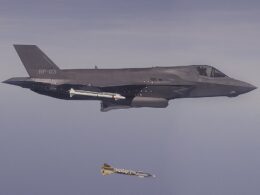Russia’s next-gen strategic bomber program may struggle to get off the ground if the West can prevent Moscow from evading sanctions, according to an investigation by InformNapalm, a Ukrainian intelligence community.
InformNapalm on 4 November reported that it acquired a trove of internal documents from Russia's aerospace component manufacturer OKBM, which the EU sanctioned in October. Purported copies of some documents were published with the investigation.
The papers show that development of the Poslannik strategic bomber and parts for the Sukhoi-57 fighter are running into delays. This is partly due to Moscow’s shortage of precise machining tools made by foreign companies that have left the Russian market. The documents linked by InformNapalm directly name this as a reason.
“At this stage, the Russian Federation is not able to produce parts for its promising aviation complexes on its own… they need to purchase foreign automated production equipment, high-precision CNC (Computer Numerical Control) machines,” InformNapalm wrote.
“This is why sanctions work and they are important, because they significantly hamper Russian military capabilities. But it is no less important to track schemes and ways to circumvent sanctions through third countries and impose secondary sanctions.”
According to the investigation, OKBM used Taiwan-made Hartford HCMC-1100AG and Johnford SL-50 machines, as well as a Serbian Grindex BSD-700U CNC grinder, bought through subsidies from Russia’s Ministry of Industry and Trade.
InformNapalm pointed to these acquisitions as examples of the Russian state’s attempts to evade sanctions.
The founder of InformNapalm, who goes by Roman Burko, told Euromaidan Press that the intelligence gathering operation directly contributed to OKBM being included in the latest sanctions package. The organization went public with the data to cause additional damage to the Russian manufacturers.
"Russian contracts explicitly state that information leaks lead to investigations, bureaucracy, and contract terminations," Burko said.
Russia’s aircraft modernization program
The Tupolev PAK DA, also known as the Poslannik (Russian for "Envoy"), is a subsonic stealth bomber meant to replace the venerable Tu-95, which dates back to the 1950s.
Russian media and other online sources report that the PAK DA is meant to have a range of 12,000 kilometers, an operational ceiling of 20 kilometers, and carry a conventional or nuclear payload of up to 30 tons. Moscow reportedly began financing development in the late 2000s and since then, the program has run into multiple delays.
Russian media previously reported that the bomber was supposed to be ready for serial production in 2027. According to InformNapalm’s investigation, OKBM is supposed to deliver components for actuating the Poslannik's weapon bays by August 31, 2027.
The documents released by InformNapalm state that the program is marked secret and OKBM may lose its contract if it fails to maintain that secrecy.
The investigation also found that OKBM is involved in making gearboxes for the weapon bays of the Sukhoi-57, a Russian multi-role stealth fighter with the NATO reporting name Felon.
The Su-57 has fought in the full-scale invasion of Ukraine. As of 2023, Russia had only 22 Su-57s in service, although it intends to increase production. Russia’s United Aircraft Corporation plans to deliver 76 fighters by 2027.
On top of modernizing its air force, Russia has entertained plans to export the Su-57 as a competitor to the American F-35 Joint Strike Fighter.
Trending Now
India initially participated in the development of the Su-57 but pulled out of the program in 2018, citing lack of satisfaction with performance and other concerns. In October, Russian Ambassador Denis Alipov made an offer to India to launch “local production” of Su-57s.
Russia evades sanctions to keep up manufacturing
At least 70% of all Russian CNC machine tools are imported, largely from the US, EU, and Japan. Over 80% of all CNCs end up in Russia's military production facilities.
While Russian military manufacturing has suffered as access to this equipment dried up following the full-scale invasion, Moscow has been able to get its hands on foreign equipment either through intermediaries or foreign companies violating sanctions.
Ukraine's Economic Security Council reported that Russia has procured $18 billion worth of machine tools from both Europe and China. This includes 57 CNC machines worth over $26.5 million from European subsidiaries, along with components and consumables valued at more than $9.5 million.
In October, Germany raided Spinner, a high-precision machine tool manufacturer suspected of knowingly supplying equipment to Russia's military industry. Three individuals have already been charged with violating sanctions.
More leaks on the way
According to InformNapalm, the documents it released on 4 November are only a fraction of the total it has managed to acquire and go over, in partnership with the cyber analytics center Fenix. Ukrainian intelligence was also reportedly involved in the operation.
InformNapalm wrote that it plans to continue publishing leaks about OKBM into the future, with the hopes that publicity will help strengthen the impact of Western sanctions on Russia's military industry.





